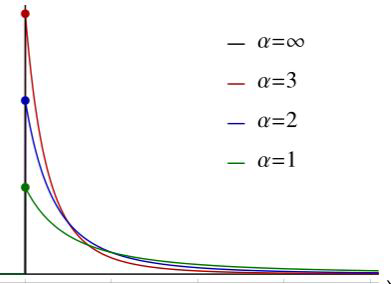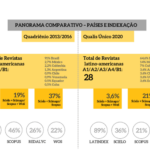 Are elite journals declining?¹ is the provocative title of an article which has just been published in the April 2014 edition of the Journal of the Association for Information Science and Technology, 65 (4) : 649 – 655 (JACIST), authored by Vincent Larivière, George A. Lozano and Yves Gingras of the Université de Montréal in Canada. The article was previously published in open access in arxiv.org, in November 2013.
Are elite journals declining?¹ is the provocative title of an article which has just been published in the April 2014 edition of the Journal of the Association for Information Science and Technology, 65 (4) : 649 – 655 (JACIST), authored by Vincent Larivière, George A. Lozano and Yves Gingras of the Université de Montréal in Canada. The article was previously published in open access in arxiv.org, in November 2013.
Vincent Larivière is a familiar name to readers of the SciELO in Perspective blog for his participation in the SciELO 15 Years Conference where he gave a presentation. An interview² with him was also published in the SciELO in Perspective blog in August 2013.
Let’s see what Larivière and his colleagues mean by the idea of “decline of the elite journals” and then we will present some opinions which were heard in the weeks that followed from researchers who discuss matters on the ResearchGate blog.
Larivière states that traditional elite journals have been growing in importance over the last few decades, and particularly over the last twenty years. For a published article to be located in the select group of the 5% most cited articles, that article must obtain twice the number of citations compared to what was required 40 years previously. But, nevertheless, although since the 1990s the number of articles published in elite journals has grown, those elite journals publish an increasingly smaller percentage of the articles in the select group of 5% mentioned above. This is particularly the case for the journals Nature and Science.
The emergence of Internet publishing has shifted the emphasis from the academic journal to the individual article and, as a consequence of this, the relationship between the journal impact factor and the citations to works published in the journals has been increasingly weakened over the last 20 years. This fact emerges from an analysis, made by Larivière’s team, of 29 million articles and 800 million citations dating from 1970 to 2012 which were taken from the Web of Science database.
Amongst the various results obtained from this experiment, one that stands out is that for the seven journals considered “elite” (Cell, Journal of the American Medical Association, Lancet, Nature, New England Journal of Medicine, Proceedings of the National Academy of Science, y Science), the proportion of the total of the most cited articles is less than it was 20 years ago even though the journals have increased the total number of articles published. This leads to the conclusion that the most important literature published today is in an increasingly broader array of sources. The digital age has resulted in authors having greater freedom to choose from these other options, making them more independent of the journals in which they normally publish.
This situation has not escaped the attention of the major publishing groups such as NPG which, instead of trying to expand their elite journals, have begun to create specialized and thematic journals under the same brand.
The article published in JASIST by Vincent Larivière and his colleagues at the Université de Montréal presents some interesting points which deserve separate analysis.
The first, which has been less talked about yet which is nevertheless important from a scientometric point of view, is the “social promotion” of an article/author as measured by the number of citations received. This now requires more effort and more time because authors have to accumulate twice the number of citations as was required in previous decades to get into the desired “top 5%”.
The second point, and one which has produced the most comments and controversies, is about the supposed decline of the international oligopoly which has always managed the so called elite journals.
The article had already generated some comments³ when it was published as a pre-print in arXiv.org. But as soon as it was published in JASIST, a debate began in the ResearchGate⁴ blog which, since the end of March, continued on for several weeks with university researchers participating from various countries, including Russia, Czech Republic, France and the USA. We recommend you look at the debate if you are registered with ResearchGate.
But more importantly, what is your opinion? Are the elite journals in decline?
We invite you to share your comments in the Comment section below.
Notes
¹ LARIVIÈRE, V., LOZANO, G.A., and GINGRAS, Y. Are elite journals declining? Article first published online: 19 Nov. 2013. Available from: http://arxiv.org/ftp/arxiv/papers/1304/1304.6460.pdf
² Interview with Vincent Larivière. SciELO in Perspective. [viewed 12 May 2014]. Available from: http://blog.scielo.org/en/2013/08/16/interview-with-vincent-lariviere/
³ Larivière, V. Study reveals declining influence of high impact factor journals. Phys.org. 7 November 2012. Available from: http://phys.org/news/2012-11-reveals-declining-high-impact-factor.html
⁴ Question: Do elite research journals get devaluated in the Internet age?
External link
ResearchGate – http://www.researchgate.net
 About Ernesto Spinak
About Ernesto Spinak
Collaborator on the SciELO program, a Systems Engineer with a Bachelor’s degree in Library Science, and a Diploma of Advanced Studies from the Universitat Oberta de Catalunya (Barcelona, Spain) and a Master’s in “Sociedad de la Información” (Information Society) from the same university. Currently has a consulting company that provides services in information projects to 14 government institutions and universities in Uruguay.
Translated from the original in Spanish by Nicholas Cop Consulting.
Como citar este post [ISO 690/2010]:

















Thanks for the coverage.